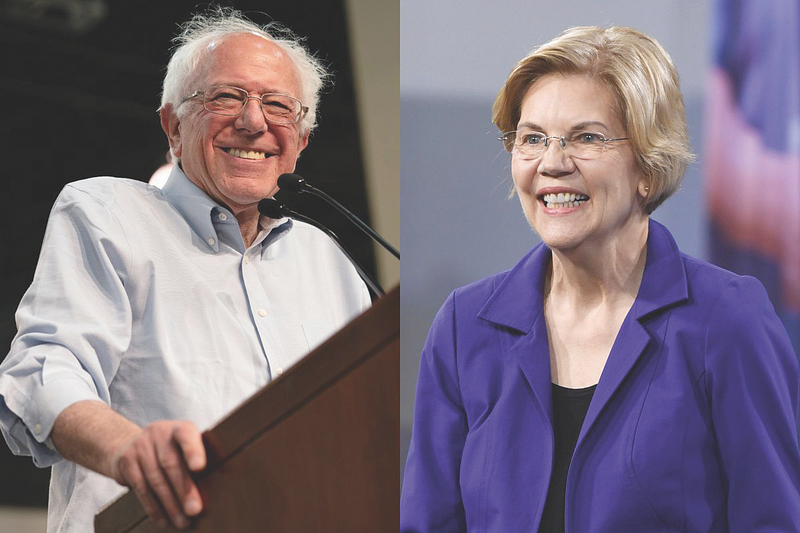
Senator Bernie Sanders and Senator Elizabeth Warren are often both grouped into the same category of “far-left” or “progressive.” I would describe my politics as left-wing progressive, and, in my opinion, the decision on who to vote for between these two candidates seems pretty straightforward: Bernie Sanders.
Progressivism, in its simplest form, advocates for political reforms that benefit the average everyday working class person. In most modern industrialized countries, this political ideology fits within the mainstream left. However, here in the United States, it is associated with the far left — and occasionally outright communism — by Republicans.
Medicare for All, tuition-free college, and a fifteen dollar minimum wage are just a few of the staples of modern American progressivism. They were brought to the center of American left-wing political thought by Senator Sanders during the 2016 presidential election cycle. His bold ideas and self-proclaimed label as a “Democratic Socialist” made many across the country — even within his own party — write him off. Today, the ideas that Bernie Sanders championed have become a large part of the mainstream Democratic agenda.
Sanders and Warren are not as similar as the media often makes them out to be. Let’s go to the issue that many Americans describe as the most important issue for them in this election: healthcare. Both, Bernie Sanders and Elizabeth Warren support a Medicare for All system, but so does nearly every Democratic candidate on the 2020 stage. Here’s the thing — the progressive Medicare for all system that Senator Sanders has championed is a single payer plan that would eliminate private insurance outside of supplemental care, which can be purchased in addition to one’s public coverage. Almost every Democratic candidate’s healthcare proposal still includes for-profit health insurance companies as a core tenet of their plans, but, simply put, this inclusion undermines the idea of a true Medicare-for-all system.
Senator Warren’s debate rhetoric regarding this issue has increasingly sounded more similar to Bernie, who was shown in a poll conducted by CNN in early July to be Democratic voters’ number one choice on who to trust with the healthcare system. Warren, however, released her specific healthcare plan recently, and you will see that nowhere is there mention of a single payer system or mention of eliminating private insurance companies, even on her campaign’s website.
Furthermore, Sanders has pledged to not take money from any major Political Action Committees (PACs) throughout this election cycle. Elizabeth Warren has said that she would accept their money in the general election. The issue with this is if she takes campaign contributions from large corporations and PACs, she will be beholden to their interests. This is a main line issue for progressives and its importance cannot be understated.
Sanders also calls for the elimination of all student loans; with Warren, only for some. Sanders wants to write off medical debt, which bankrupts 500,000 Americans annually; Warren has not yet outlined a similar goal. Warren voted to increase Trump’s already-bloated military budget by $680 billion; Sanders voted in opposition. Finally, in the 2016 election, Elizabeth Warren did not endorse Bernie Sanders, the progressive candidate with whom she is more relatively more ideologically aligned, instead choosing to endorse Secretary Hillary Clinton, who ran on a centrist platform. It is hard to understand the thought process behind that decision, but it does make me wonder about whether her current rhetoric matches her true beliefs.
I would like to make this clear: Elizabeth Warren would be a great candidate for President. If she is the nominee in the general election she will wholeheartedly receive my vote. However, if you label yourself as a progressive, democratic socialist, or any related ideology, the choice of candidate in the primary should be Bernie Sanders. His views have been consistent, and he is beholden to no special interest. He embodies a true progressive.

















